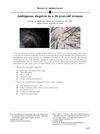TLDR Hypothyroidism can cause hair loss, which is often reversible with treatment.
Alopecia is frequently observed in hypothyroidism, affecting up to 50% of patients, and is linked to decreased thyroid hormone's impact on peripheral vasoconstriction, sebum secretion, hair growth rate, and increased telogen hairs. Restoring normal thyroid levels can reverse hair loss unless follicles are atrophied. Autoimmune thyroid disorders may need additional treatments like minoxidil, laser therapy, microneedling, corticosteroids, PRP injections, and dietary supplements. Oral minoxidil is effective for those struggling with topical forms. PRP shows promise in improving hair loss and quality of life, but more large-scale studies are needed to confirm its efficacy and standardize protocols.
 15 citations
,
October 2020 in “Journal of Investigative Dermatology Symposium Proceedings”
15 citations
,
October 2020 in “Journal of Investigative Dermatology Symposium Proceedings” Platelet-Rich Plasma (PRP) could potentially help regrow hair in people with Alopecia Areata, but more research is needed to confirm its effectiveness.
 59 citations
,
July 2020 in “Journal of The American Academy of Dermatology”
59 citations
,
July 2020 in “Journal of The American Academy of Dermatology” Oral minoxidil promotes hair growth but may cause side effects; needs monitoring.
 44 citations
,
July 2011 in “Dermato-endocrinology”
44 citations
,
July 2011 in “Dermato-endocrinology” Thyroid hormone affects skin health, with too little causing rough, pale skin and too much leading to smooth, thin skin, and may also impact wound healing and skin conditions.
 144 citations
,
July 2002 in “Clinical and Experimental Dermatology”
144 citations
,
July 2002 in “Clinical and Experimental Dermatology” Telogen effluvium is a common type of hair loss that can resolve on its own or become chronic, with treatment depending on early diagnosis.
 1 citations
,
October 2022 in “PubMed”
1 citations
,
October 2022 in “PubMed” Patients generally have positive attitudes towards using topical Minoxidil for hair loss treatment.
 1 citations
,
October 2020 in “Journal of Cosmetic Dermatology”
1 citations
,
October 2020 in “Journal of Cosmetic Dermatology” Using minoxidil and tofacitinib together can effectively treat severe hair loss.
 August 2018 in “Oxford University Press eBooks”
August 2018 in “Oxford University Press eBooks” The document's conclusion cannot be provided because the document cannot be parsed.
July 2013 in “DeckerMed Family Medicine” The document's conclusion cannot be provided because the document is not readable or understandable.

The woman has unexplained hair loss and it's unclear what her condition is or how to treat it.
 71 citations
,
March 2009 in “Seminars in cutaneous medicine and surgery”
71 citations
,
March 2009 in “Seminars in cutaneous medicine and surgery” Alopecia areata can cause unpredictable hair loss, and treatments like corticosteroids and minoxidil may help but have varying side effects.
 72 citations
,
January 2001 in “Drugs”
72 citations
,
January 2001 in “Drugs” Minoxidil and finasteride treat hair loss; more research needed for other options.









